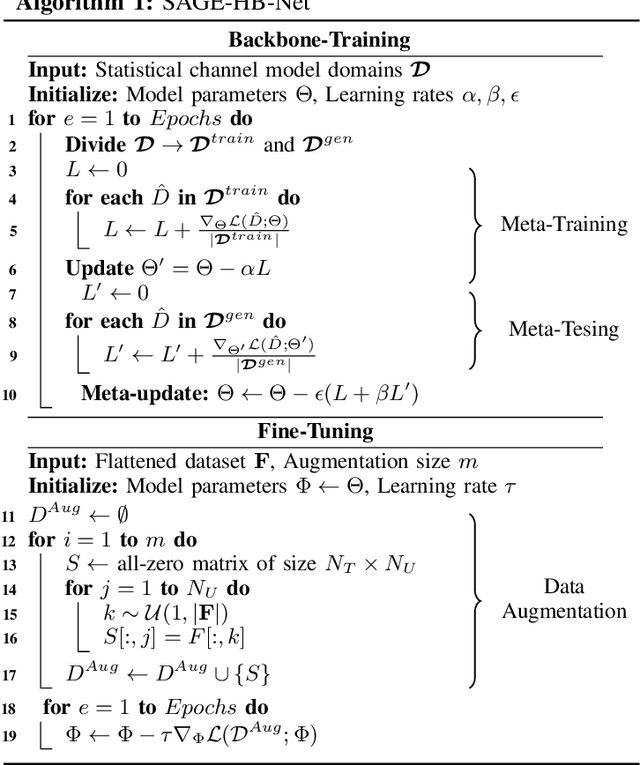Ali Hasanzadeh Karkan
A Foundation Model for Massive MIMO Precoding with an Adaptive per-User Rate-Power Tradeoff
Jul 24, 2025Abstract:Deep learning (DL) has emerged as a solution for precoding in massive multiple-input multiple-output (mMIMO) systems due to its capacity to learn the characteristics of the propagation environment. However, training such a model requires high-quality, local datasets at the deployment site, which are often difficult to collect. We propose a transformer-based foundation model for mMIMO precoding that seeks to minimize the energy consumption of the transmitter while dynamically adapting to per-user rate requirements. At equal energy consumption, zero-shot deployment of the proposed foundation model significantly outperforms zero forcing, and approaches weighted minimum mean squared error performance with 8x less complexity. To address model adaptation in data-scarce settings, we introduce a data augmentation method that finds training samples similar to the target distribution by computing the cosine similarity between the outputs of the pre-trained feature extractor. Our work enables the implementation of DL-based solutions in practice by addressing challenges of data availability and training complexity. Moreover, the ability to dynamically configure per-user rate requirements can be leveraged by higher level resource allocation and scheduling algorithms for greater control over energy efficiency, spectral efficiency and fairness.
A Low-Complexity Plug-and-Play Deep Learning Model for Massive MIMO Precoding Across Sites
Feb 12, 2025



Abstract:Massive multiple-input multiple-output (mMIMO) technology has transformed wireless communication by enhancing spectral efficiency and network capacity. This paper proposes a novel deep learning-based mMIMO precoder to tackle the complexity challenges of existing approaches, such as weighted minimum mean square error (WMMSE), while leveraging meta-learning domain generalization and a teacher-student architecture to improve generalization across diverse communication environments. When deployed to a previously unseen site, the proposed model achieves excellent sum-rate performance while maintaining low computational complexity by avoiding matrix inversions and by using a simpler neural network structure. The model is trained and tested on a custom ray-tracing dataset composed of several base station locations. The experimental results indicate that our method effectively balances computational efficiency with high sum-rate performance while showcasing strong generalization performance in unseen environments. Furthermore, with fine-tuning, the proposed model outperforms WMMSE across all tested sites and SNR conditions while reducing complexity by at least 73$\times$.
Compression of Site-Specific Deep Neural Networks for Massive MIMO Precoding
Feb 12, 2025



Abstract:The deployment of deep learning (DL) models for precoding in massive multiple-input multiple-output (mMIMO) systems is often constrained by high computational demands and energy consumption. In this paper, we investigate the compute energy efficiency of mMIMO precoders using DL-based approaches, comparing them to conventional methods such as zero forcing and weighted minimum mean square error (WMMSE). Our energy consumption model accounts for both memory access and calculation energy within DL accelerators. We propose a framework that incorporates mixed-precision quantization-aware training and neural architecture search to reduce energy usage without compromising accuracy. Using a ray-tracing dataset covering various base station sites, we analyze how site-specific conditions affect the energy efficiency of compressed models. Our results show that deep neural network compression generates precoders with up to 35 times higher energy efficiency than WMMSE at equal performance, depending on the scenario and the desired rate. These results establish a foundation and a benchmark for the development of energy-efficient DL-based mMIMO precoders.
SAGE-HB: Swift Adaptation and Generalization in Massive MIMO Hybrid Beamforming
Jan 19, 2024



Abstract:Deep learning (DL)-based solutions have emerged as promising candidates for beamforming in massive Multiple-Input Multiple-Output (mMIMO) systems. Nevertheless, it remains challenging to seamlessly adapt these solutions to practical deployment scenarios, typically necessitating extensive data for fine-tuning while grappling with domain adaptation and generalization issues. In response, we propose a novel approach combining Meta-Learning Domain Generalization (MLDG) with novel data augmentation techniques during fine-tuning. This approach not only accelerates adaptation to new channel environments but also significantly reduces the data requirements for fine-tuning, thereby enhancing the practicality and efficiency of DL-based mMIMO systems. The proposed approach is validated by simulating the performance of a backbone model when deployed in a new channel environment, and with different antenna configurations, path loss, and base station height parameters. Our proposed approach demonstrates superior zero-shot performance compared to existing methods and also achieves near-optimal performance with significantly fewer fine-tuning data samples.
 Add to Chrome
Add to Chrome Add to Firefox
Add to Firefox Add to Edge
Add to Edge